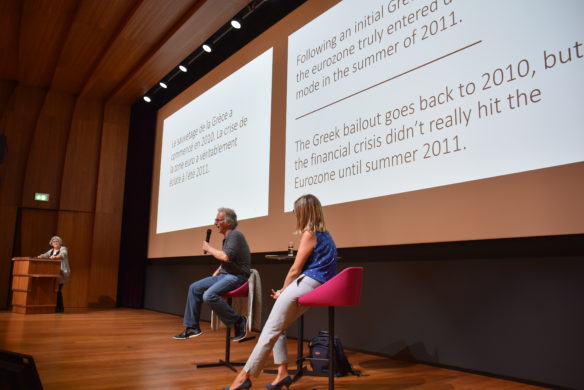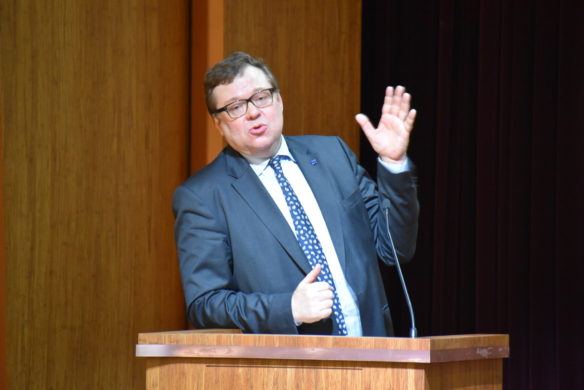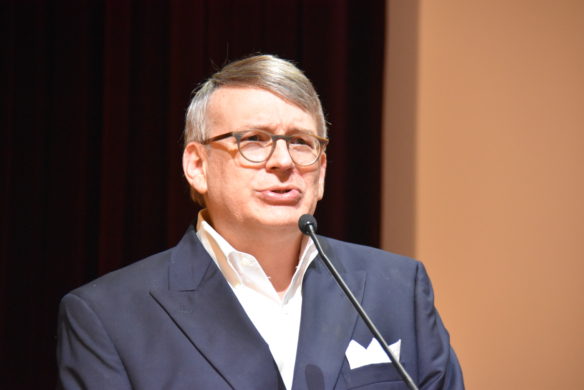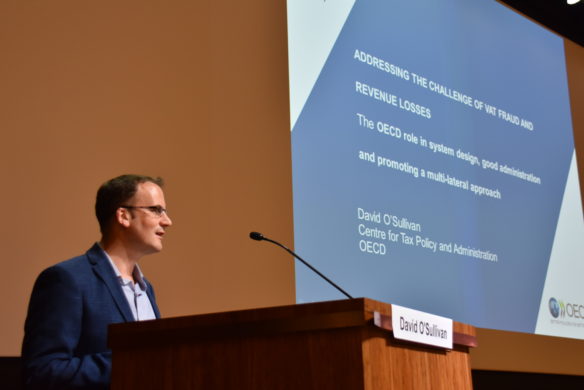After attending the 3rd ICEBFIT conference in Alicante then spending a few days with friends in the Barcelona area, I was glad to be escaping the scorching hot and humid conditions of the Mediterranean and jetting off to Brussels, where I could cool down a bit. Or so I thought… Turned out it was almost as hot, so I’d travelled half way around the world with a thick coat for nothing. And at times the heat felt worse, as northern Europe is far less prepared for it than the south, so there is often no air conditioning on public transport or in buildings.
Anyway, enough about the weather.
I was in the Belgian capital for part 2 of my financial translation CPD trip, at the 2018 Financial Translation Summer School (UETF), which is organised every even-numbered year by Société française des traducteurs (SFT) (non-members may attend). This year’s UETF was hosted by BNP Parisbas Fortis at its headquarters, conveniently located right in the heart of Brussels, just around the corner from the Central Station. The auditorium was excellent, the facilities top-notch and the two huge screens perfect for reading every last detail of presenters’ slides without squinting. A rather different experience from the dingy classrooms and noisy air conditioning units in Alicante a week earlier!
I had been a little apprehensive about going, as I expected the list of attendees to be dominated by translators who know financial reports like the back of their hand, translators who can tell you the ins and outs of the Basel III liquidity rules without consulting any notes. Would a translator who focused on macroeconomic reports feel out of depth in a sea of financial translators sensu stricto? With a price tag of €795, I didn’t want to go if I wasn’t going to learn anything relevant to my line of work.

Larry Cohen and Rosie Wells face off in the French-English slam, with Chris Durban watching over. Photo by Bernhard Lorenz, used with permission.
Nevertheless, I was reassured by some of the items on the programme that were closely related to the work I do, especially the talk on tax policy (more on that later), and I’d read glowing reviews about the biennial event. Since I was attending another event in Europe just a week earlier (this was before my September move from Namibia to Scotland), I decided to give it a shot. Further reassurance of the event’s relevance to my line of work came when, a couple of weeks before the conference, I received the text for the French-English translation slam: an article from the Belgian economics and finance magazine Trends-Tendances about banking union in the euro zone. The subject matter was right up my street, as it contained the kind of discussion and analysis found in economics books and reports I’ve translated.
The UETF has already been lauded in blog after blog. And this post is no different.
A unique event for translators
What makes the UETF so unique among events organised for translators is that most of the talks are not specifically about translation. Instead, they aim to educate translators about a particular subject or field in which they might work. The speakers included a journalist, an expert on the EU, an OECD tax policy adviser and senior figures at various companies and organisations in the field of finance (including the Belgian director of country services for French oil giant Total). The presentations covered the topic of finance in the broadest sense of the word.
The highlights reel
The UETF 2018 programme was so packed that, were I to write about every session, the post would become far too long, so I will mention just some of the sessions that stood out for me.
The French word doctor
Thursday and Friday morning began with short, 20-minute sessions called “Allo, docteur Termino” and “Word Doctor”, respectively. The speakers in these two sessions looked at specific strategies translators can use to make their target-language output sound more authentic and less like a translation.
On the Thursday, co-organiser Dominique Jonkers showed us various sentences he had worked on that contained forms of the English word support (sometimes as a noun, sometimes as a verb). Dominique argued that the word support is used far more frequently than the words that normally appear in its place in French translations: appuyer, supporter, appui(s).
After showing each English example sentence, Dominique asked audience members – especially those who work into French – to propose French translations that did not use the obvious, instinctive translations for the word support. The aim was to create a more authentic text that better reflected what a French author might have written. For each example, drawn from a real project he had worked on, Dominique listened to a few proposals from the audience before revealing the solution he had used in his project. His translations often had a completely different structure from the source text, but even to a foreign ear like mine, the end results clearly sounded more genuinely French.
Domnique’s alternative translations included épauler, aide, être entourés, contribuer à la realisation de, avaliser, and porter assistance à.
The English word doctor
On the Friday, it was the turn of English-speaking word doctor Martin Hemmings (whom I finally met in person, having previously only met him “virtually”). Martin explained that authentic, non-translated English texts frequently use what are called “embedded questions”.
Anyone who works with French and English will know that French uses far more nouns than English, and few things make an English text sound more like a translation than when they constantly use the “[noun] of the [noun] of the [noun]” structure. Martin showed examples of how embedded questions can often replace French nouns to create a more authentic-sounding English text. (By the way, the previous sentence includes an example of an embedded question, which sounds so natural you probably didn’t even notice it.)
Martin noted that restructuring the sentence to insert an embedded question usually forces the translator to take a step back and think about what the author means, which is always a good thing, since we translate ideas not words!
Let’s look at one of his examples. Martin showed us a source text that read as follows:
Les organisations devraient contrôler les droits d’accès au système comptable.
It would come as no surprise to see this translated as:
Organisations should control access rights to the accounting system.
This translation wouldn’t necessarily be wrong (though the usage of “control” is questionable). But is it what an English-speaking author would have written? Martin proposed the following translation instead:
Organisations should check who has access to the accounting system.
I think most English speakers would agree that the result sounds more natural. Furthermore, the solution underlines the point made about taking a step back. Had the context (which Martin had been privy to when he translated this sentence) been different, and the text had been discussing different levels of access, then the sentence might have been better translated as:
Organisations should check what level of access each member of the accounting department has.
That is why it is important to take a step back and to look at the overall context when using embedded questions not found in the source text. Translators using this strategy must be extra sure they understand what the source text means (there’s another embedded question!), but by doing so they can produce a more polished text.
Martin even gave examples of embedded questions that he had spotted in the slides of other English-speaking presenters in previous sessions, thus underlining the fact that English really did use this structure frequently, and that his examples weren’t merely the result of cherry-picking from a huge corpus.
The doctors’ prescriptions
If the Word Doctor sessions could be summarised in two sentences, they would be:
- When translating the English word support into French, look for solutions other than appuyer, supporter and appui, according to the context.
- When translating from French to English, look for opportunities to use embedded questions, especially if the sentence contains too many nouns (particularly the [noun] + de + [noun] structure).
Both of these sessions were useful for both English-speaking and French-speaking translators, since both of these tips can be turned on their heads:
- When translating from French to English, look for opportunities to simplify the sentence by using forms of the word support.
- When translating embedded questions from English to French, look to restructure the sentence, in many cases replacing the embedded question with a noun.
The FSMA
Second up on the opening day was Jean-Paul Servais (pictured below), who is President of the Belgian Financial Services and Markets Authority (FSMA), Vice-President of the International Organization of Securities Commissions (IOSCO) and a lecturer at the Université libre de Bruxelles (ULB). Goodness knows how he finds the time to do all three!
Jean-Paul’s excellently prepared presentation explained what the FSMA does to protect consumers of financial products and what it has achieved. The clearest indication of the organisation’s success is that financial products are becoming less complex: between 2015 and 2017, the amount invested in financial products involving at least three mechanisms fell by a quarter as a proportion of total investments in financial products. Of course, less complex financial products is good news for translators who are tasked with explaining these mechanisms in another language!
We learned that the FSMA engages in one of Chris Durban’s favourite pastimes: mystery shopping! But the FSMA uses mystery shopping to ensure that organisations that sell financial products comply with the regulations, so it’s a little different to what Chris Durban does in the unregulated translation sector.
Jean-Paul Servais briefly talked about the website Wikifin.be, a financial education programme that has had a whopping 7 million visits since its launch in 2013. Given these impressive viewing figures, it’s a shame that the site was under maintenance at the time of the presentation and is still under maintenance at the time of writing (August 2018). I look forward to visiting this promising resource once it is back on its feet.
The polyglot lawyer
According to Tom West’s company website, he is ATA-certified for translation from French, Spanish, German and Dutch to English and he has also studied Danish, Swedish, Portuguese, Afrikaans and Russian. Quite a polyglot then!
But despite this vast assortment of languages, Tom (pictured below) clearly knows his stuff in the area of law. Since he was addressing an audience of translators who all work with French and English, he demonstrated his expertise in legal terminology in those two languages, but anyone looking for evidence that he is just as knowledgeable in some of his other languages need only turn the pages (or check out the online previews) of his highly acclaimed Spanish-English Dictionary of Law and Business and Trilingual (French, German and English) Swiss Law Dictionary.
Tom West gave two presentations: one on the terminology used in French and English to describe different types of companies, and one discussing the implications of a new French law on the due diligence duties of companies. The content was excellent, and would be impossible to summarise in a small section of a blog post, but to give you a taste of what to expect if you ever attend one of his talks, I’d encourage you to read his excellent review of what for many of us is our go-to French-English legal dictionary, the Council of Europe French-English Legal dictionary. During his talks, he dealt with some of the points included in that article.
At last, a non-literary slam!
There’s no better way to wind down from a day at a translation conference than a good-old translation slam, but I think every one I’d ever been to before this one dealt with literary texts. Not that I don’t enjoy a literary slam, but since I am a non-literary translator, it made a refreshing change to see non-literary translators putting their reputations on the line in front of an audience of translators. Wednesday’s slam was French to English; Friday’s, the other way round. Well done to Larry Cohen (see the photo at the start), Rosie Wells (idem), Christèle Blin and Jeremy Fileul for being brave enough to defend their excellent translations in front of their peers.
All about the EU (and, of course, Brexit)
Brexit seems to have been the big story in the news for an eternity now, and with the UK still trying to negotiate a final deal, it was the subject, directly or indirectly, of three talks at UETF. Dutch writer and journalist Joris Luyendijk gave his views on “why it happened, how it happened, what happens now”, while Charles Grant, of the Center for European Reform, discussed “Brexit and its consequences”. The president of the American Chamber of Commerce in Brussels, Howard Liebman, meanwhile, focused more on what the European Union does.
Addressing VAT fraud
As I mentioned in the introduction, I had been worried UETF would focus on finance in a narrow sense, but the speakers dealt with a broad spectrum of related subjects, and it was perhaps David O’Sullivan’s presentation about measures to combat VAT fraud that was most closely connected to the kind of work I specialise in. Taxation is a central topic in the macroeconomic reports about developing countries that I translate and edit, usually for his own organisation, the OECD.
David O’Sullivan (pictured below) explained why VAT is such a common form of taxation, used by 170 countries, how the OECD helps to create standards to ensure that everybody pays what they should to the treasury, and how the explosion of international trade in services (including translation services!) has created challenges for policymakers to deal with. He also gave examples of tax-evasion schemes, which often fund organised crime, with one of his slides showed an excellent graphic illustrating how carousel fraud works. Finally, David outlined what governments must do to tackle VAT fraud and how new technologies can assist them in doing so.
Other sessions
I have mentioned just some of the sessions that stood out for me. But ask attendees what stood out for them and they might tell you about David Berenger‘s talk on how US shale gas will make up for the shortfall in oil supply in the coming years (budding translators looking for a specialism take note!), or maybe Jean-Luc Layon‘s overview of the French multinational oil giant Total, or one of the other presentations.
Networking opportunities
Opportunities to network were aplenty. Breakfast was available every morning for those who arrived early, followed by a mid-morning coffee break. Every day, we had a delicious lunch buffet, where I ticked tasting steak tartare off my bucket list.
(It was actually filet américain, but that’s close enough. I’ve never been brave enough to order it off a restaurant menu, lest I find it revolting and have to resort to Atkinsonian methods to hide my embarrassment at not being able to eat it. As it turned out, it was rather delicious.)

Autoworld has a beautiful collection of vintage cars. We got the chance to wander round the magnificent collection before the gala dinner.

I’ve uploaded the full resolution versions of the car pictures so you can see them in all their splendour. Just click on the thumbnails to enjoy!
On the Wednesday evening, I had dinner with a group of translators in the heart of the old city, and on the Friday evening I went out for drinks with two translators while watching Belgium outplay Brazil in the World Cup quarter-finals. And then there was the delicious gala dinner at the fabulous Autoworld museum, which has a huge collection of the most splendid vintage cars.
The high price tag for the event had the advantage of filtering out bottom-feeder translators and agencies, so most of the translators I was mingling with while enjoying the best of Belgian cuisine were serious ones willing to invest in their professional development, and therefore the kind of translators I’m inclined to work with.
My one disappointment with the networking was that there were few opportunities to chat with the industry speakers. As far as I know, the only non-linguists who were around during the networking sessions were the ones who had just given a presentation, so 95% of the time I found myself networking with other translators, just like I do at any other translation conference. Not that I see any way around this, as all the “outside” speakers were busy people who don’t have time to hang around and be pestered by translators. The solution for translators looking to get leads is to use the Q&A sessions to introduce themselves to the speakers, to use the coffee and lunch breaks to start a conversation with the speaker and get his or her business card, and then to follow up on that conversation after the event.
But generating leads is not the raison d’être of UETF. I probably won’t get any work directly from any of the speakers, but I’ve improved my expertise in finance, improved my raw translation skills thanks to the Word Doctors and the workshop, and I’ve networked with translators operating in a similar market to me. All these things will be beneficial to my career.
A lesson for other conference organisers
By inviting speakers from outside the translation sector, UETF offers two major benefits to those attending. First, the translators have an opportunity to mingle with people who desperately need high-quality translations and are willing to pay the price that such translations command. And second, the translators have access to insider knowledge in their specialist fields.
Most translation conferences do not focus on a particular genre, but organisers could still invite specialists who work in certain fields. A few already do. In fact, some of the most popular sessions held at the conferences organised by Mediterranean Editors and Translators (MET) have been workshops run by
a statistician and a medical doctor.
Since generic translation conferences are attended by people who specialise in a wide range of fields, it’s impossible for organisers to please everyone, but perhaps some of the larger conferences could run some parallel sessions presented by professionals working in a certain field. One or two more generic talks could take place during the same slot for those not interested in any of the fields being presented. Alternatively, these thematic sessions could be held as optional extra activities the day before the main conference kicks off.
Sign up for the next edition
At UETF 2018, the content was excellent and the delivery superb, so I would highly recommend that any English- or French-speaking translators who work in finance or related fields sign up for the next edition, in 2020, probably in Paris. And if you can’t wait that long, you could always attend the 2019 event in Switzerland organised by the Swiss Association of Translators, Terminologists and Interpreters.





